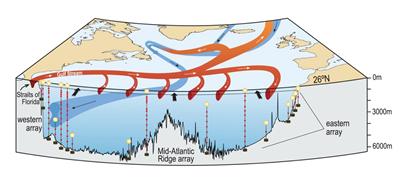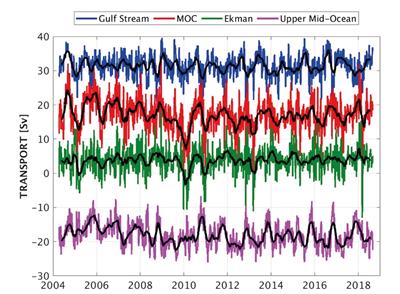Background:
The global overturning circulation influences climate by transporting heat northwards in the Atlantic Ocean, by supplying warm water to the Antarctic margin, and by controlling the exchange of carbon and nutrients between the deep ocean and the euphotic zone where photosynthesis occurs. The Atlantic meridional overturning circulation (AMOC) collapsed several times during the last glacial period, and climate models project that it will weaken in response to anthropogenic climate change.

Key Questions:
1. Is the Atlantic meridional overturning circulation (AMOC) slowing? Can we distinguish a long-term trend in the AMOC from variability, and how soon?
2. What is the climate impact of changes and variability in the AMOC? What is the impact on temperature and precipitation patterns, sea level, and what is the climate feedback associated with the uptake of anthropogenic carbon?
3. How great is the risk of AMOC collapse due to anthropogenic climate change? Can the AMOC collapse due to projected CO2 increases? Can we detect an imminent collapse of the AMOC before irreversible changes have already occurred?
4. What is the climate impact of changes and variability in the global MOC? How do the AMOC and Antarctic overturning interact? Were changes in global overturning the major cause of glacial-interglacial cycles in CO2, and what is their future role?

How do we do it?
The Physics Group invented the Rapid system for monitoring the AMOC (Figure 1) and led the Rapid project for the first 8 years. The observational time series at 26°N presently has a duration of 16 years and provides the baseline for the rate, structure and temporal variability of the overturning circulation (Figure 2). Decreases in the AMOC lead to cooling and freshening of the ocean waters in the northern Atlantic and the changes particularly in subpolar North Atlantic salinity potentially have great effect on the anticipated decrease in the global overturning circulation over the coming century.
We are also investigating the evolution of the Mediterranean overturning circulation, which is a prototype case study for climate change due to its compactness and accessibility. We have shown in collaboration with the Paleo Group and Italian colleagues that the Mediterranean is becoming saltier over the recent century and we are studying small scale mixing processes (salt fingers) with French colleagues to understand their role in the ongoing salinification of the deep Mediterranean Sea.
The Physics Group has developed the application of “rotated geostrophy” to climate models, to elucidate how changes in temperature and salinity at high latitudes control the AMOC. Rotated geostrophy, unlike earlier approaches based on spatially averaged density gradients, is able to deal with complex changes in vertical density structure.
Rotated geostrophy has led to insights into the response of the AMOC to the input of freshwater to the North Atlantic, which is the most likely cause of past and possible future collapse. An example of this is in our collaboration with the UK Met Office working with the state-of-the-art climate model HadGEM3-GC2. We have found that there are two distinct mechanisms by which freshwater input may weaken the AMOC in this model: (1) by directly freshening the high latitude ocean; or (2) by preventing surface heat loss from the high latitude ocean by the formation of a freshwater cap. If (1) dominates, the AMOC weakening is reversible by ceasing to add freshwater. On the other hand, if (2) dominates in HadGEM3-GC2, the AMOC does not recover, and the climate impacts are more severe.
Who in the Physical Oceanography Group is involved?
Prof Harry Bryden, Dr Kevin Oliver, Dr Phil Goodwin.